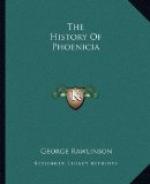INSCRIPTION ON A MARBLE TABLET FOUND IN CYPRUS
“On the seventh day of the month . . . in the thirty-first year of the Lord of Kings, Ptolemaeus, son of Ptolemaeus . . . which was the fifty-seventh year of the Citians, when Amarat-Osiri, daughter of . . . son of Abd-Susim, of Gad’ath, was canephora of Asinoe Philadelphus, these statues were set up by Bathshalun, daughter of Maryichai, son of Esmunadon, to the memory of his grandsons, Esmunadon, Shallum, and Abd-Reseph, the three sons of Maryichai, son of Esmunadon, according to the vow which their father, Maryichai, vowed, when he was still alive, to their lord, Reseph-Mikal. May he bless them!"[1330]
There is a little more variety in the inscriptions on tombstones. The great majority, indeed, are extremely curt and dry, containing scarcely anything beyond the name of the person who is buried in the tomb, or that together with the name of the person by whom the monument is erected; e.g. “To Athad, the daughter of Abd-Esmun, the Suffes, and wife of Ger-Melkarth, the son of Ben-hodesh, the son of Esmunazar"[1331]; or “This monument I, Menahem, grandson of Abd-Esmun, have erected to my father, Abd-Shamash, son of Abd-Esmun"[1332]; or “I, Abd-Osiri, the son of Abd-Susim, the son of Hur, have erected this monument, while I am still alive, to myself, and to my wife, Ammat-Ashtoreth, daughter of Taam, son of Abd-melek, [and have placed it] over the chamber of my tomb, in perpetuity."[1333] But, occasionally, we get a glimpse, beyond the mere dry facts, into the region of thought; as where the erector of a monument appends to the name of one, whom we may suppose to have been a miser, the remark, that “the reward of him who heaps up riches is contempt;"[1334] or where one who entertains the hope that his friend is happier in another world than he was upon earth, thus expresses himself—“In memory of Esmun. After rain, the sun shines forth;"[1335] or, again, where domestic affection shows itself in the declaration concerning the departed—“When he entered into the house that is so full [of guests], there was grief for the memory of the sage, the man that was hard as adamant, that bore calamities of every sort, that was a widower through the death of my mother, that was like a pellucid fountain, and had a name pure from crime. Erected in affection by me his son to my father."[1336]
With respect to the extent and range of the Phoenician book literature, the little that can be gathered from the notices remaining to us in the Greek and Roman writers is the following. In Phoenicia Proper there were historical writers at least from the time of Hiram, the contemporary of David, who wrote the annals of their country in a curt dry form somewhat resembling that of Kings and Chronicles.[1337] The names of the kings and the length of their reigns were carefully recorded, together with some of the more remarkable events belonging to each reign; but




